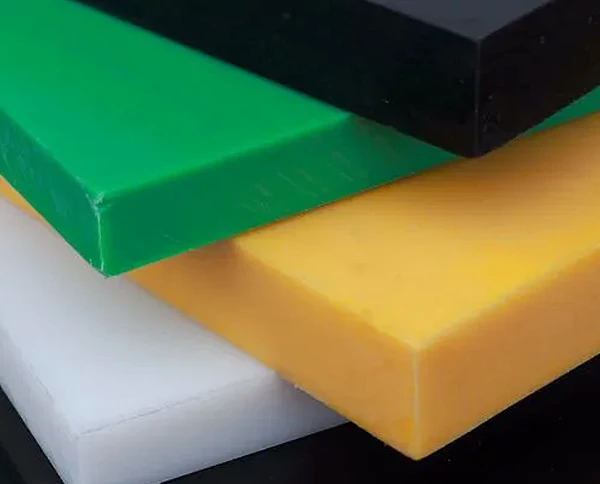
Types of Plastic for CNC Machining
Plastic
There are many different types of metal materials used in CNC machining. In order to choose the best machining material for your product, it is important to understand the characteristics, cost, and applicable time of various materials before machining.
We evaluate the cost of various machining materials for you and provide instant quotes for more than 100 different types of metals.
- Guarantee the quality of raw materials
- Evaluate with professional engineers
- Consider the long-term interests of customers
Plastic materials List
Plastics are a highly favored choice for CNC machining due to their extensive variety, relatively affordable cost, and notably swift machining duration. We offer immediate quotes for over 100 types of plastic, facilitating price comparisons across various processing materials for your convenience.
ABS
PMMA
PF
PC
PA
PP
PEEK
POM
PVC
PTFE
ABS
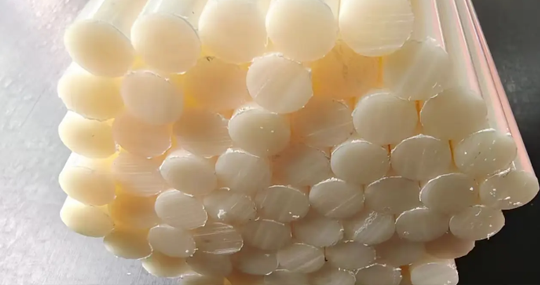
ABS
ABS, composed of three monomers—acrylonitrile, butadiene, and styrene—possesses a distinctive array of qualities, such as exceptional impact resistance, effective heat resistance, and outstanding dimensional stability.| Mechanical properties | |
|---|---|
| Ultimate tensile strength | 27.6 – 55.2 MPa |
| Yield strength | 18.5 – 51 MPa |
| Young’s modulus | 1.1 – 2.9 GPa |
| Elongation at break | 10 – 50 % |
| Hardness | 5.6 – 15.3 HV |
| Thermal properties | |
|---|---|
| Maximum service temperature | 61.9 – 76.9 °C |
| Thermal expansion coefficent | 84.6 – 234 10^-6/ºC |
| Thermal conductivity | 0.188 – 0.335 W/(m⋅°C) |
PMMA
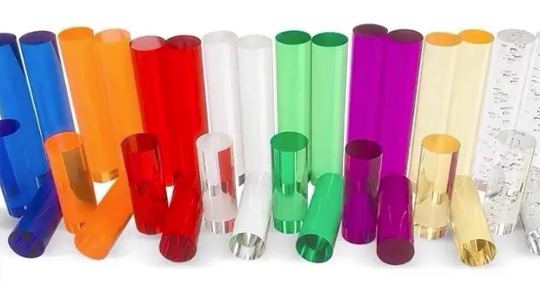
PMMA
PMMA, commonly referred to as acrylic, is a durable and transparent substance that withstands UV radiation and weathering. Its versatility allows for easy coloring, shaping, and utilization across a wide range of construction applications, owing to its appealing aesthetics.| Mechanical properties | |
|---|---|
| Ultimate tensile strength | 55 – 83 MPa |
| Yield strength | 64 -80 MPa |
| Young’s modulus | 2.76 – 3.3 GPa |
| Elongation at break | 3 – 6.4 % |
| Hardness | 64 – 105 HRM |
| Thermal properties | |
|---|---|
| Maximum service temperature | 70 – 80 °C |
| Thermal expansion coefficent | 50 – 90 10^-6/ºC |
| Thermal conductivity | 0.19 – 0.2 W/(m⋅°C) |
PF
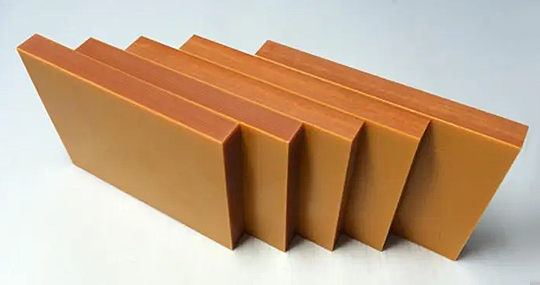
PF
PF is a thermosetting plastic that has been widely used in electronic products, automobiles, aerospace, medical equipment and other fields due to its excellent physical, mechanical and chemical properties.PC
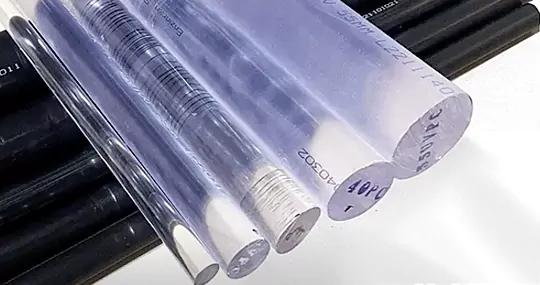
PC
Polycarbonate, a robust and resilient plastic, exhibits flame-retardant and antioxidant characteristics. Renowned for its outstanding impact resistance, transparency, and mechanical attributes.| Mechanical properties | |
|---|---|
| Ultimate tensile strength | 60 – 72.4 MPa |
| Yield strength | 59- 70 MPa |
| Young’s modulus | 2 – 2.44 GPa |
| Elongation at break | 50 – 120 % |
| Hardness | 17.7 – 21.7 HV |
| Thermal properties | |
|---|---|
| Maximum service temperature | 101 – 144 °C |
| Thermal expansion coefficent | 120 – 137 10^-6/ºC |
| Thermal conductivity | 0.189 – 0.218 W/(m⋅°C) |
PA

PA
PA has good comprehensive properties, including mechanical properties, heat resistance, wear resistance, chemical resistance and self-lubrication. It has a low friction coefficient, has certain flame retardancy, and is easy to process.| Subtypes | Ultimate tensile strength | Yield strength | Young’s modulus | Elongation at break | Hardness |
|---|---|---|---|---|---|
| Nylon 6 | 64.7 – 79.1 MPa | 51.2 – 63.8 MPa | 1.58 – 1.97 GPa | 200-300 % | Shore D70 |
| Nylon 6 30% GF | 113 – 138.1 MPa | 111 – 137 MPa | 6.5 – 8.1 GPa | 2.81 – 4.05 % | Shore D92 |
| Nylon 66 30% GF | 90 MPa | 90 MPa | 5 GPa | 10 – 14 % | Shore D76 |
| Nylon 6 FR | 82 MPa | 82 MPa | 3.8 GPa | 3 % | Shore D83 |
| Nylon 12 | 80 MPa | 80 MPa | 1.9 GPa | 200% | Shore D78 |
| Nylon 66 | 76 MPa | 50 – 80 MPa | 1.85 GPa | 50% | Shore D82 |
PP

PP
Polypropylene (PP) showcases exceptional chemical resilience, a lofty melting threshold, and minimal density. When employing CNC machining on PP, employing a sharp cutter with an elevated front angle and reduced cutting speed is imperative. These precautions thwart material overheating and melting.| Subtypes | Ultimate tensile strength | Yield strength | Young’s modulus | Elongation at break | Hardness |
|---|---|---|---|---|---|
| PP Homopolymer | 19 – 30 MPa | 0.7 – 1.2 GPa | min. 50 % | ||
| PP | 23 – 33 MPa | 30 – 32 MPa | 0.9 – 1.6 GPa | 8 – 12 % | 65 – 102 HRR |
| PP+GF(30%) | 68 – 85 MPa | 6.5 – 7 GPa | 2.1 – 3.4 % | 110 HRC |
PEEK
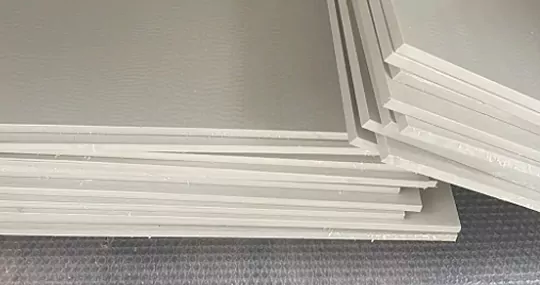
PEEK
Polyetheretherketone (PEEK), an extraordinary engineering thermoplastic, is renowned for its remarkable attributes, such as exceptional resistance to high temperatures, inherent self-lubrication, ease of processing, and unparalleled mechanical robustness.| Mechanical properties | |
|---|---|
| Ultimate tensile strength | 70.3 – 103 MPa |
| Yield strength | 87 – 95 MPa |
| Young’s modulus | 3.76 – 3.95 GPa |
| Elongation at break | 30 – 150 % |
| Hardness | 26.1 – 28.5 HV |
| Thermal properties | |
|---|---|
| Maximum service temperature | 239 – 260 °C |
| Thermal expansion coefficent | 50 – 60 10^-6/ºC |
| Thermal conductivity | 0.24 – 0.26 W/(m⋅°C) |
POM
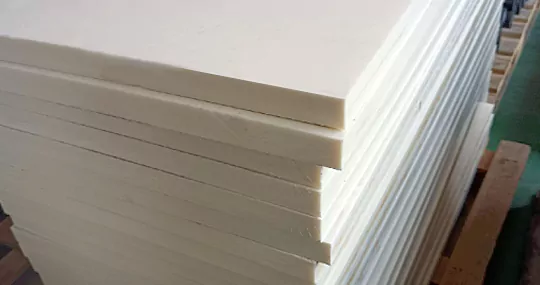
POM
Polyoxymethylene (POM), a thermoplastic substance, is celebrated for its elevated stiffness, minimal friction, ease of machining, and remarkable dimensional stability. Nevertheless, the machining process of POM presents challenges, attributable to its heightened melting threshold and susceptibility to chipping or cracking when cutting parameters are not meticulously managed.| Subtypes | Ultimate tensile strength | Yield strength | Young’s modulus | Elongation at break |
|---|---|---|---|---|
| Acetal Copolymer(POM-C) | 60 – 70 MPa | 60 – 67 MPa | 2.5 – 2.7 GPa | 30 – 32 % |
| Acetal Copolymer (POM-C) FDA | 70 MPa | 66 – 70 MPa | 2.8 – 3 GPa | 32 – 40 % |
| Acetal Homopolymer (POM-H) | 60 – 89.6 MPa | 48.6 – 72.4 MPa | 2.5 – 4 GPa | 15 – 75 % |
| Acetal Copolymer (POM-C) ESD | 39 MPa | 45 MPa | 2.5 – 2.7 GPa | 40 – 50 % |
PVC
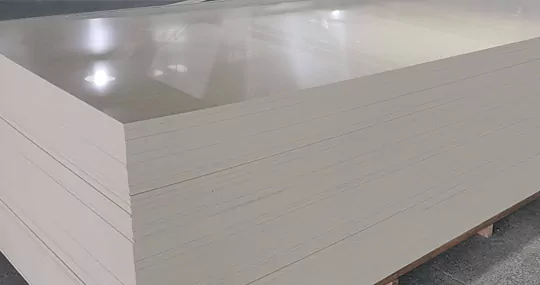
PVC
PVC, robust and resilient, exhibits resistance to chemicals, weather, and fire. Nonetheless, machining PVC can generate hazardous dust and fumes, posing risks to workers’ safety. To ensure the well-being of workers, employ appropriate safety gear and implement adequate ventilation measures during the machining procedure.| Mechanical properties | |
|---|---|
| Ultimate tensile strength | 46 – 58 MPa |
| Yield strength | 53 – 58 MPa |
| Young’s modulus | 2.18 – 3.41 GPa |
| Elongation at break | 25 – 80 % |
| Hardness | 13.7 – 16.6 HV |
| Thermal properties | |
|---|---|
| Maximum service temperature | 85 – 100 °C |
| Thermal expansion coefficent | 112 – 149 10^-6/ºC |
| Thermal conductivity | 0.133 – 0.144 W/(m⋅°C) |
PTFE
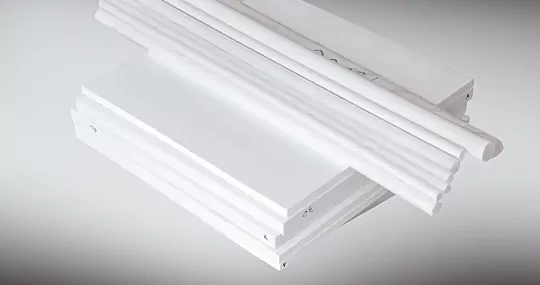
PTEE
PTEE has high strength, high stiffness and excellent high temperature resistance. Its resistance to wear and chemical attack is also excellent. Compared with other engineering plastics, ptee has a lower friction coefficient and good self-lubricating properties.| Mechanical properties | |
|---|---|
| Ultimate tensile strength | 25 – 31 MPa |
| Yield strength | 14 – 41.4 MPa |
| Young’s modulus | 0.39 – 2.25 GPa |
| Elongation at break | 300 – 450 % |
| Hardness | 50 – 65 Shore D |
| Thermal properties | |
|---|---|
| Maximum service temperature | 250 – 270 °C |
| Thermal expansion coefficent | 7 – 20 10^-6/ºC |
| Thermal conductivity | 0.23 – 0.5 W/(m⋅°C) |
